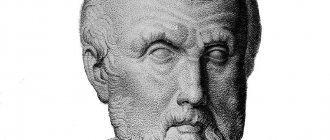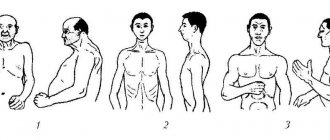features and differences
The definition of character is a set of persistent, relatively permanent psychological qualities that determine a person’s attitude to the world around him and his behavior. Experts identify several criteria by which temperaments are classified.
The connection between temperament and character
It should be noted that psychologists consider temperament and character as two complementary concepts. The formation of personality occurs under the influence of individual behavioral characteristics. It should be understood that characteristics and types of character are formed and manifested under the influence of temperament.
Difference of terms
It is necessary to understand the basic concepts, namely, temperament and character - what are the differences.
- Character is a person’s behavior in various situations. This is a combination of individual qualities that a person acquires throughout life. Personality characteristics are determined by the social environment in which personal qualities develop.
- Temperament is an emotional response to external stimuli. These are innate human properties, determined by the biological and mental characteristics of the individual.
It is important! Certain character traits are revealed depending on the social environment and environment where a person finds himself. Temperament does not change and remains constant regardless of the conditions and accompanying circumstances.
In psychology, it is customary to evaluate only the traits and types of individual qualities of a person. We can say that a person has a good, bad or strong character, but such assessments do not apply to temperament. Based on value judgments, the specialist identifies personal shortcomings and selects a strategy to eliminate them.
Capabilities
Important personality traits are considered to be abilities that determine the individual style of activity and are the basis for its success. There are also qualities that provide the ability to interact with other people and are necessary to gain respect and authority from others.
Abilities and inclinations
Abilities are a complex system of human qualities and properties. Their biological basis is inclinations, that is, innate physical and mental characteristics, including temperamental properties. But not only. Often, inclinations are associated with the psychophysiological characteristics of the body; they are given to a person from birth and are necessary for success in a particular activity. But they don't guarantee it.
For example, an ear for music is required by a musician, and a high sensitivity of the visual analyzer is required by an artist. But this alone is not enough to master an activity, much less to achieve success. To do this, you need to develop abilities, and this is only possible through activity and requires the investment of labor and willpower. Mastery is not a gift given by nature or God, but, above all, work and perseverance.
Is it possible to develop abilities in the absence of natural inclinations? This is a very difficult question; there is no clear answer to it. Undoubtedly, in the absence of the necessary qualities, it will be more difficult to master the activity, it will require more effort and, perhaps, the achievements will not be so impressive. But recently, more and more psychologists support the idea that a persistent and persistent person can learn anything. The main thing is to give him the right training techniques. That is, to teach any person to draw, you just need to know how to teach correctly.
Types of abilities
The whole variety of human abilities is usually divided into two types: general and special.
Special qualities include those qualities that are required to master a specific activity, such as, for example, an ear for music for playing musical instruments or a phonetic ear for learning foreign languages. Playing sports requires endurance and mobility, and working with children requires a sense of empathy.
General abilities are no less diverse, because they are needed in a wide variety of areas of activity. First of all, these include mental abilities or level of intelligence. Although intelligence is considered an innate characteristic of a person, mental abilities require their development, including the quality of memory, attention, thinking, as well as the volitional sphere and reflection.
Sometimes a high level of mental ability combined with learning ability is called giftedness. This quality of a person can compensate for his lack of some special abilities and allow him to achieve success in many types of activities.
No matter how valuable abilities are, they are only potential, an opportunity for further development and improvement of a person. The same can be said about other individual psychological characteristics. Each individual has the opportunity to become a unique, extraordinary, talented person, but for this you need to know your psychological characteristics, your strengths and weaknesses and actively engage in self-development.
Typology of characters
The most popular is the typology proposed by the German psychologist Kretschmer. In his opinion, a person’s character types depend on the characteristics of his figure and physique.
Types of character according to Kretschmer
- "Picnics" . Outwardly, these are dense people who tend to be overweight, of short or medium height, with a large head, short neck and small facial features. From a psychological point of view, such people - cyclothymics - are emotional, easily make contact, and quickly adapt to new circumstances and living conditions. It is in this category that people prone to manic-depressive syndrome are most often found. In this article, read about disharmonious personality development.
- "Athletics" . Outwardly, these are tall people with broad shoulders, strong muscles and chest. From a psychological point of view, people of the “ixothymic” type are practical and reserved. Character weaknesses - power, inability to show emotions and adapt to new circumstances. With complex psychological disorders, such people develop epilepsy.
- "Asthenics" . People of this type can be recognized by their thin physique, underdeveloped muscles, long legs, arms and elongated face. Psychological type - schizothymic - they are characterized by stubbornness, isolation and inability to adapt to life circumstances. People of this psychological group are prone to schizophrenia.
Character types in Jung's classification
Another classification was proposed by the Swiss psychiatrist Carl Gustav Jung. The dominant criterion of the typology is the dominant emotional functions - feelings, intuition, thinking and sensations. In his opinion, in every person, to a certain extent, the external or internal world prevails. In this regard, Jung classifies people into two types - introverts and extroverts.
Introverts are closed, focused on their inner world, and deliberately isolate themselves from external circumstances. They tend to analyze events, worry, listen to personal feelings and value their health. It is difficult for such people to meet people and change habits.
Extroverts are direct, open to communication, and active. They have many friends, because the worst thing for an extrovert is loneliness. My favorite hobby is traveling, and my favorite way to relax is to spend time with friends, tell jokes and, of course, become the life of the party.
Character types by temperament
Another common classification is the comparison of a certain temperament with specific individual qualities. In this case, you need to take into account that in everyday life it is impossible to meet a person with pronounced traits of a particular temperament. People are more likely to have mixed types of temperaments.
- Choleric - he is characterized by such manifestations as impetuosity, speed of decision-making, passion and imbalance. What character traits require correction - emotional imbalance and fatigue. Cholerics tend to quickly get carried away and waste their energy irrationally.
- Phlegmatic - unhurried, emotionally stable, does not show emotions. What are the dominant qualities - perseverance, poise, productivity and diligence in work.
- A melancholic person is a person who tends to worry about every even minor event. Character weaknesses - emotional vulnerability, excessive impressionability.
- A sanguine person is an active, “alive” person with frequent mood changes. What character traits are dominant - reacts quickly to all events, easily experiences troubles. He has expressive facial expressions and high productivity at work, provided that the task at hand is interesting to him.
HYPERTHYMIC (OR HYPERACTIVE) CHARACTER
Optimism sometimes leads such a person to the point that he begins to praise himself, setting out the “natural theory of generational change” and prophesying high positions for himself. A good mood helps him overcome difficulties, which he always views lightly as temporary and passing. Voluntarily engaged in social work, strives to confirm his high self-esteem in everything. This is the hyperthymic character. If in the team you lead there is a person with a hyperthymic character, then the worst thing you can do is to entrust him with painstaking, monotonous work that requires perseverance, limit contacts, and deprive him of the opportunity to take initiative. Such an employee is unlikely to be of any use. He will be violently indignant at the “boredom” of work and neglect his responsibilities. However, the discontent that arises in these cases is of a benign nature. Having escaped from conditions unacceptable to him, hyperthym, as a rule, does not hold a grudge against others. Create conditions for the manifestation of initiative - and you will see how brightly the personality will reveal itself, the work will begin to boil in his hands. It is better to place hypertims in production areas where contacts with people are required: they are indispensable in organizing work and in creating a climate of goodwill in the team.
Adaptation and health disorders in hyperthymic people are usually associated with the fact that they do not spare themselves. They take on a lot, try to get everything done, run, rush, are excited, often express a high level of demands, etc. It seems to them that all problems can be resolved by increasing the pace of activity.
The main recommendation for people with a hyperthymic type of character is not to hold back, as it might seem at first glance, but to try to create such living conditions that would allow them to express vigorous energy in work, sports, and communication. Try to avoid stimulating situations, extinguish excitement by listening to music, and so on, up to light calming psychopharmacological treatment and autogenic training.
Personality formation - advice for parents
Many people are interested in the question of whether character changes. Indeed, personal qualities are formed and change throughout life. The process begins in early childhood. The first individual traits of a child appear already in preschool age; parents can identify a certain way of behavior and attitude towards the world.
If you want to raise your child with a strong personality, to develop perseverance, courage and endurance in your child, involve him in group games with a certain plot and rules.
How to build character and teach a child to work and responsibility? From childhood, assign simple tasks to your child, gradually complicating them. Thus, the child develops discipline, self-control, behavior is determined, and the baby learns to evaluate his actions and decisions. Thus, self-education occurs.
A new stage in personality formation begins when a child enters school, when his ability to communicate with classmates and perform new responsibilities is demonstrated. As a result of a change in environment and lifestyle, the child develops organization, accuracy, and hard work.
It is important! In childhood, the personality of the baby is influenced by the character of the parents and their habits. At school, the main role in character development is played by the school community - classmates, teachers.
A child’s character is revealed through the following areas during school:
- organization and systematicity;
- determination and perseverance;
- accuracy and hard work;
- discipline;
- consciousness of duty and responsibility to the school community;
- collectivism and camaraderie.
In adolescence, personal characteristics develop most actively, because at this age the child is attracted to adult life, and higher demands are placed on him. Feelings such as duty, responsibility, participation in the collective life of the class manifest themselves more consciously.
It is possible to change a child's character. Psychologists note that there are no children whose personal characteristics could not be re-educated. However, the process requires the participation of a specialist who can identify character flaws and select the most effective strategy for further action.
Character types, their expression, “weak points”
Currently, there are many classifications of character. Particularly interesting and meaningful are those that arose in the border area at the intersection of psychology and psychiatry. They contain the experience of talented clinical scientists who worked directly with people, observed their behavior, studied biographies, talked with their relatives, and helped in difficult life situations and problems. Here you can find such names as K. Jung, E. Kretschmer, P. B. Gannushkin, K. Leongard, A. E. Lichko, M. E. Burno, M. Z. Dukarevich and others. The first classifications contained only two types (K. Jung, E. Kretschmer), nowadays there are many more of them.
We will focus on eight main types, which, with some variations, are found among most authors. Specific examples and illustrations will be taken from the observations of the same authors, fiction, our own personal experience and the stories of other people.
People differ in the degree to which their character traits are expressed. In one they are very noticeable, in the other they seem to be smoothed out, softened. The best way to get to know characters is through examples of their expressed degrees (accentuations), which is what we will do in this book. By the way, such pronounced characters are observed in more than half of the population. This means that in every family there is likely to be a person with an accented character. If we talk about teenagers, then “sharp corners” of character are found in most of them, although they usually smooth out over the years.
In general there are no bad and good characters. Each character has its own strengths and weaknesses. Strong properties are usually visible, they speak for themselves, but weak ones often still need to be recognized.
Talking about character weaknesses brings us to the very important concept of character weaknesses. Such a “place” means a person’s increased sensitivity, or vulnerability, to certain conditions. Such conditions are different for different characters. One person finds it difficult to bear the loss of attention from loved ones, another finds it difficult to bear the restriction of his freedom, and a third cannot bear the burden of responsibility and high expectations. When there is a load on a weak point of character, a person gives a negative reaction. This can be expressed in different ways, from withdrawing into deep resentment to “breaking dishes” and hysterics. If stress on a weak point is repeated frequently and for a long time, then the experience of trouble intensifies, sometimes leading a person to a state of “impossibility”: a child runs away from home, a spouse gets divorced, an employee submits a letter of resignation.
Hence it is clear that knowledge of the “weak points” of each character is of invaluable practical importance. It helps to behave competently with a person, preventing unnecessary complications in the family and at work, and mistakes in raising a child. We will definitely dwell on the weak points of each character when getting to know individual types.
What to do if you don't like your partner's character
Think about what exactly you don’t like: the character as a whole or some specific trait. In the first case, the question arises as to whether you really want to continue the relationship with this partner. In the second case, it is worth talking about it directly and discussing with your partner how you can correct the current situation. If you do not understand or do not know how to cope with the current situation, offer your partner couples therapy with a psychologist. A psychologist will help you come to an understanding.
It is not at all necessary that partners match in character, because in a relationship common interests, principles, and moral principles are much more important.
What to do if people around you don’t like your character
First of all, it is important to understand that a person cannot be liked by everyone without exception. If dissatisfaction with your character is completely justified, and the person is really dear to you, ask what personality traits in you do not suit him. Close people have no interest in telling lies. If you yourself realize that you need to get rid of a certain trait, and its manifestations interfere with your life, then try to work on yourself.
But think about whether you will lose your individuality. When you cannot get rid of an annoying trait on your own, consult a psychologist. It will help identify the reason why the negative trait manifests itself and help you choose appropriate ways to work on it.
Are a person’s character traits predetermined from birth?
Everyone knows that temperament and external characteristics can be inherited not only from parents, but also from previous generations based on genotypes. But are character traits genetically transmitted? Scientists have come to the conclusion that character traits and inclinations are not inherited; they can only develop over time under the influence of family, environment, and in the process of education. A child can adopt certain habits from his parents and try to be like them, thereby shaping his character.
Character traits are not inherited
The main types of characters in a child
The foundation of character is laid in early childhood and depends on parents. The more attention and love, the greater the chance of developing positive traits. Once in a team (nursery group, kindergarten group, class), the child begins to copy some behavioral traits of “colleagues” and adults. Until the age of 16, the formation of the volitional sphere and moral and ethical standards occurs.
In child psychology, there are also several behavioral manifestations, depending on which you can find the right approach to raising a child.
The main character types include:
- sensitivity – with increased emotionality and expressed feelings;
- activity – this group includes children with increased communication;
- receptivity - a manifestation of obedience, obedience to a schedule and the ability to feel emotions.
The character of a child is shaped by parents and teachers. If you take into account the expressed traits when raising, then you can replace negative manifestations with positive ones. Just don’t push and rush. When communicating with children, delicacy and attention are required.
What to do if you don't like your character
If a person does not accept himself, then it is difficult to talk about any happiness or self-satisfaction. The best way to fix a problem is to fight it. If you don't like your character or some of its traits, follow these tips:
- Observe yourself, do a character analysis. Make a list of traits you want to change.
- Many character traits have antonyms, like good and evil, honest and deceitful. Try to find an antonym for the trait that you don’t like. He will become your ultimate goal.
- Try to remember a hero, an idol, just a famous person, whose character seems ideal to you, the qualities of a person. Imagine how they would behave in your place.
- Change your habits that interfere with or contribute to the manifestation of an unwanted trait. If, for example, this trait is laziness, force yourself to play sports and get up earlier. Create a daily plan for yourself and stick to it.
Your personality requires constant work on yourself
How a person's character is formed
A person’s character cannot be called stable; the process of formation occurs throughout a person’s life under the influence of various factors. Let's look at the factors influencing its formation.
At what age is character formed?
The Romans also called newborns tabula rasa - “blank card”. Is it so? It has been scientifically proven that character begins to form before the birth of a child - hormones entering the mother’s body begin to shape the character of an unborn person. That is why, during pregnancy, future parents are advised to communicate with the child, turn on music, and monitor the emotional state of the mother. Even during breastfeeding, the mother's hormones can pass through the milk to the baby.
Character begins to form in the womb
Parenting factors
Nevertheless, the main personal characteristics are formed at the age of 3–4 years, primarily under the influence of the family. Raising a child consists precisely in instilling in him the correct values, behavior, and moral rules. Taken together, education is one of the most important factors influencing the development of a still small, but already human.
Although many psychologists argue that in childhood the most important factor is not so much upbringing as personal example. Children identify themselves and try to imitate the adults around them, therefore the best and most effective way to raise a child is to raise oneself.
Genetic influence
As mentioned earlier, only the transmission of temperament is genetically possible. Temperament, in turn, influences the development of character, so temperament can be called a factor of genetic influence on the formation of character. Temperament determines the formation of certain human traits.
For example, sanguine and choleric people, due to their openness and extraversion, are distinguished by their sociability, sociability and activity. Phlegmatic people are the most stress-resistant, while melancholic people are more often shy and insecure.
External social influence
From 7 to 15 years of age, the influence of the social environment is the most important factor in the formation of character. In the process of personality formation, children take examples not only from their parents, but also, for example, from educators and teachers. Schools and other educational institutions (kindergartens, clubs, sections) have a great influence on the developing character. The child meets a large number of people with different views and beliefs, types of thinking, and level of upbringing. Public opinion influences the formation of habits, rules of behavior, and interests.
In addition, the media can also have a social influence on character. For example, seeing news reports about crimes and what punishment the criminals suffered, the child will understand that such behavior is unacceptable and should refrain from such actions. Unfortunately, there are situations when the result is exactly the opposite.
The process of socialization has a direct impact on the formation of personality
Is it possible to cultivate certain character traits in yourself?
Character development is a completely normal process in which every person is interested. Each of us, sooner or later, is faced with overcoming ourselves in order to become a “better version of ourselves” and achieve great success in life or simply become a good person. How can you develop any character traits in yourself? For example, to develop punctuality, make plans and set reminders. If you are often late, try to leave twice as early as you usually leave. To overcome uncertainty, get out of your comfort zone and try what causes this uncertainty in you.
How to find out a person's character?
The characteristics of a person are manifested in everything he does, how and what he says, how he reacts to certain events. If you understand what kind of character a person has, you will be able to understand him better. To find out the character of another person, sometimes it is enough just to observe him.
Character in communication
In communicating with people, you can understand character traits that will tell you how a person relates to others, work, himself, and life in general. For example, hobbies can tell about your mindset, activity, love of life, and passion. A broad outlook will allow you to judge curiosity and openness to new things. The manner of communication will tell you about the emotionality, seriousness, good manners and education of the interlocutor. If a person speaks loudly, confidently, and does not hold back his emotions, then in front of you is an open and courageous person, easy-going. If the speech is quiet, the gestures are restrained, then this person is most likely not confident in himself, a reserved, calm person. Don’t be afraid to communicate with people and observe them; this will help in further communication and interaction.
Through communication you can learn a lot about a person's character.
Character is in the details
Little things can tell a lot about a person's character. Pay attention to the following details:
- Reaction to humor, jokes. There are characters with whom people take jokes as a personal insult; such individuals, as a rule, have low self-esteem.
- Eating food. People who eat slowly are usually patient and cheerful. People with fast food intake are not patient and can be ambitious.
- Who are they talking about? People with low self-esteem, modest and closed personalities do not like to talk about themselves. When the number of “I”s in a conversation increases, such a person is self-confident, selfish, and prone to narcissism.
Ask mutual friends
When you have to communicate with a stranger, ask mutual friends about their impressions or opinions about him. This will help you establish interpersonal contact faster.
But do not forget that this opinion will be quite subjective; try not to label it in advance.
Stressful situations
In stressful situations, people show their emotional and volitional character traits. People with leadership qualities react quickly to such situations and quite easily find a solution to the problem.
About human character in conflicts
Svetlana Kovalenko
Psychologist, clinical psychologist
Ask a Question
The most indicative for determining the character of a person are conflict situations. In general, conflicts are a normal phenomenon for any relationship; what is important is how a person constructs a conversation, whether he is trying to get out of a conflict situation and how to treat you during a quarrel. In normal communication, you may not notice anger, aggression, neglect, selfishness, emotional immaturity and even abuse. But in conflicts it is impossible to hide this. If your partner puts pressure on you during a quarrel, devalues your words and aspirations, and this does not in any way correspond to the image that has formed in your head, it is worth thinking about the real traits of his character, and not about those that he tried to show you.
Psychology is a complex and subtle science, therefore, to get to know a person it takes years and going through various kinds of situations.
Character of a person by handwriting
When you have the opportunity to study a person's handwriting, be sure to take it. Handwriting can also tell a lot about a person's character.
- Sweeping handwriting means a person is generous, but prone to negligence and negligence.
- Captious people with complexes, thrifty or stingy people write in condensed handwriting.
- Illegible handwriting indicates that the person is nervous and energetic.
- Pale handwriting - this person loves loneliness, is not confident in himself, has complexes.
- Large handwriting shows that the person is kind and open, sociable, has emotional stability, and is interesting to communicate with.
- Small handwriting is characteristic of purposeful, reserved people.
Handwriting analysis is often used in investigations when it is necessary to create a description of a person’s personality and character
Social character and its varieties
A scientist at the Frankfurt Psychoanalytic Institute, E. Fromm, differentiated into groups a set of personality traits that develop in the same environment, and introduced a new term into psychology - “social character.” In each category of persons, peculiarities of perception and behavior appear under the influence of similar factors. Based on research, 2 types were identified.
Fruitful
People from this group tend to give their strength for the benefit of others. An example is the unconditional love of a mother for her newborn child.
Unfruitful
Individuals assigned to this group receive benefits from others. Types of social character considered unfruitful:
- Cumulative. People in this category are suspicious, stubborn, sarcastic, and love to dominate. They lack creativity.
- Market. Low commitment, lack of integrity.
- Receptive. Persons in this group are weak-willed, cowardly, with low vital activity and are in a subordinate position.
People with unproductive personalities love to dominate.
The exploitative type is the most dangerous. People related to it are ambitious, but they achieve success at the expense of others, showing aggressiveness. Egocentrism and arrogance do not appear immediately.









